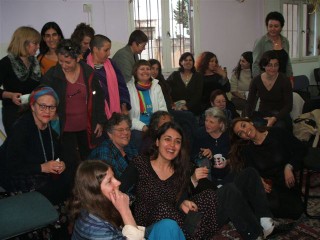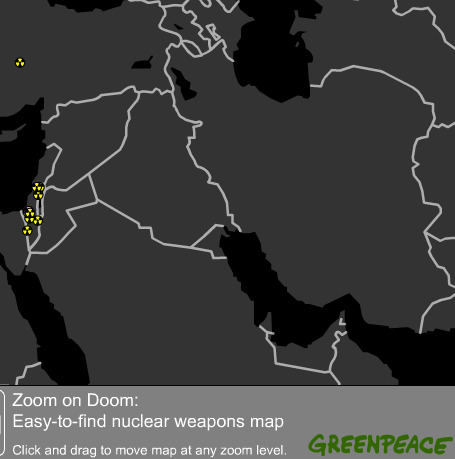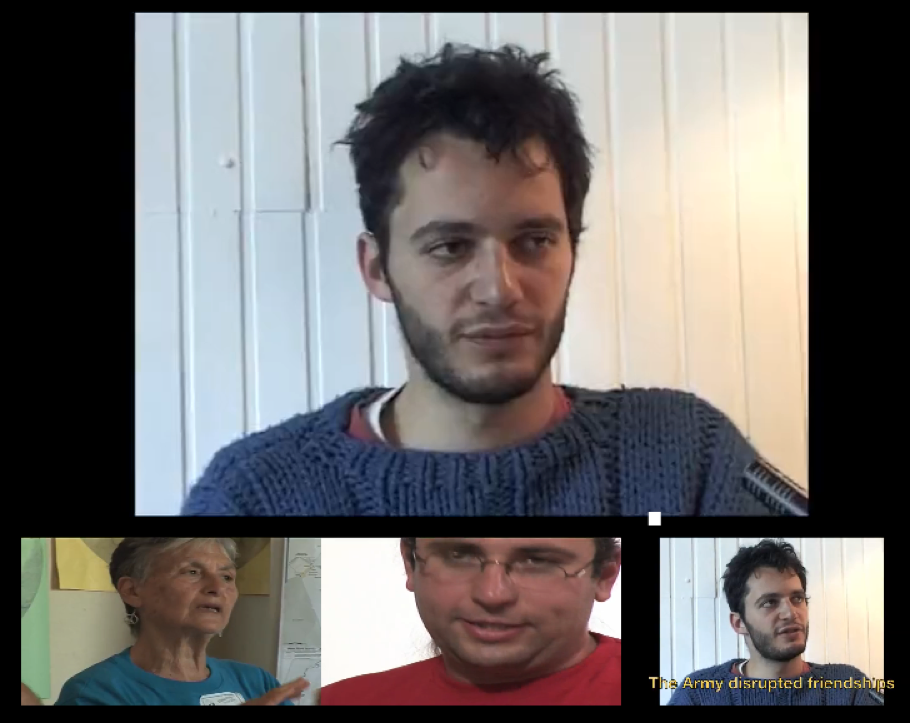The Only Democracy? » Discrimination » Israel’s Nukes Are Off Limits, UPDATED with comment from Gideon Spiro
Israel’s Nukes Are Off Limits, UPDATED with comment from Gideon Spiro
By Rela Mazali
In an extensive, research-based 2009 position paper titled: On Nuclear Weapons: A Feminist Perspective, Edna Gorney and Hedva Eyal of the Isha L’Isha Haifa Feminist Center wrote, “the Israeli public remains excluded from the [nuclear] debate. The public does not ask questions, does not demand that the state takes responsibility, nor does it demand to be involved in decision making; it accepts and is content with the information or, more accurately, with the lack of information.”
This passive indifference to the nuclear weaponry widely believed to be in the public’s backyard is, in my view, a highly dangerous manifestation of Israel’s longtime and entrenched militarization. As Gorney and Eyal have put it, “Decision-making in all areas related to security is characterized by secrecy and vagueness, excluding anyone who does not belong to the security elite. … The secret functions both on the outside as well as on the inside. Denying information under the guise of maintaining secrecy is one of the common ways through which elites maintain their status. … [While o]ne of the ways they can attain legitimacy for their control and actions is to continuously disseminate and instill fear – real and imaginary – among the citizens of Israel. This fear justifies and, in turn, foments military power and its use against any security threat, as defined by this elite group.”
Meanwhile, Gorney and Eyal have noted, “We are flooded with information on the great threat Iran poses and on the necessity of military operations. The debate within the Israeli public discourse is almost devoid of the possibility of solution through diplomatic means.”
Outlining the severely undemocratic suppression of any public nuclear debate in Israel, the position paper lists a line of researchers, journalists, politicians, activists and ex-security personnel who’s critical voices have been stifled by the security establishment, using a broad range of tactics. This in addition to the constant dissemination of fear underpinning militarization in general and the unquestioning Israeli public acceptance of its governments’ nuclear armament in particular. Thus, the risks of such armament to this public itself, as well as the entire area or even the globe, go unexamined and undebated for decades on end.
Resisting this reality and reaching for an actual, participatory democracy, Gorney and Eyal explain, “As feminists we wish to expose the connections between the policy of opacity, concealment and fear, and the current perception of security. We want to take responsibility for our lives and for actions carried out in our name.”
In one of the rare public voices taking up these issues, the position paper concludes:
“We demand the removal of opacity surrounding the issue of nuclear weapons in Israel; We demand a public debate and the development of an alternative policy that will enable us to live in peace in the Middle East; We demand nuclear disarmament; We demand that the State of Israel join the International Treaty on the Non-Proliferation of Nuclear Weapons.”
Click here to download the full 22 page position paper.
Another such public voice, sounded now for many years, is that of nuclear historian and analyst, Avner Cohen, whose work is one of main sources repeatedly referred to by the Isha L’Isha position paper. Cohen is equally critical of successive Israeli governments’ successful barring of nuclear debate and, in a recent op-ed, offers a series of serious arguments against what he views as the irresponsible and extremely dangerous possibility that Israel might launch a military attack against Iran in an attempt to quash its nuclear capacity.
Cohen’s op-ed, converging in part with some of the conclusions presented by the Isha L’Isha position paper, was published April 2nd in Haaretz and claims, among other things, that:
Instead of a public discussion [of a possible Israeli attack against Iran] there has been a belligerent press, which makes demagogic use of statements that intensify the message of the politics of fear. These include expressions such as ‘Iran is galloping toward a bomb’ and a ‘second Holocaust’ that Israel must prevent. Such discourse creates a feeling that if Iran is not attacked, and soon, we have no choice but to accept a nuclear Iran. [Meanwhile,] It’s doubtful whether the people making those statements are capable of giving them a precise (technical and political) interpretation.
[Israel’s is] a culture of national security in which nuclear opacity has been exploited to the hilt to create a specific model of deterrence. The result is that when [… we Israelis] look at Iran we see ourselves: how we would behave in a similar situation. [… This] leads to systematic errors when making assessments.”
A comment regarding Avner Cohen, from Gideon Spiro:
Cohen’s recent op-ed in Haaretz was an important one as it supports the
claims of those who oppose the dangerous adventure of an Israeli military
strike against Iran. However, please make no mistake: Avner Cohen is no ally
of the struggle to dismantle Israel’s nuclear arsenal. He is a staunch
supporter of the Israeli nuclear bomb and his book “Israel and the Bomb” is
a hymn singing the praises of the nuclear program in Dimona. I have
personally confronted Cohen on several occasions, some of them public, most
recently several months ago on Al Jazira.”
Gideon Spiro is a Tel-Aviv based journalist and activist in various Israeli
and international peace and human rights movements, one of the founders of
the “Yesh Gvul” peace movement and the “Israeli Committee for Mordechai
Vanunu and for a Middle East Free of Atomic, Chemical and Biological
Weapons.
Filed under: Discrimination · Tags: militarization, Nuclear Weapons










 “You have a choice! Israeli Anti-Militarists Speak”
“You have a choice! Israeli Anti-Militarists Speak”